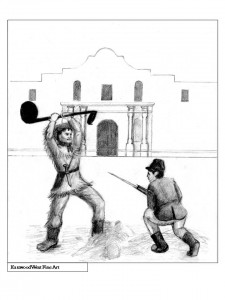The Napoleon of the West
Posted in General on March 10th, 2008 by Eugene Finerman – 4 CommentsImagine a leader with George Bush’s ability, Mitt Romney’s principles and Bill Clinton’s vices. Yes, he would be an unsurpassed disaster and, at the very least, lose two-thirds of the country. And that is the unique place of Antonio Lopez de Santa Anna (1794-1876) in Mexico’s history.
He fancied himself the Napoleon of the West, his self-proclaimed military genius based on a single victory over a diseased Spanish force in 1829. However, the real Napoleon had only one Waterloo; Santa Anna had a series of them. He lost Texas because he never thought that Sam Houston would attack the Mexican army during its siesta. Of course, after that disgrace, Santa Anna fell from power. Yet, he managed to charm and bargain himself back into office by 1847, promising to defend Mexico from the invading Americans. That is how and why Mexico lost the other half of its territory. (His defense of Mexico City was no Alamo.)
Given this record, you’d think that he would have lost face. Actually, he only lost a foot–in 1838, failing to defend Vera Cruz from a French expedition collecting debts. But for 30 years, Santa Anna was unavoidable in Mexican politics. Shifting from liberal to conservative and back again–his only consistency was vanity–Santa Anna won the Presidency 11 times, even though his administrations rarely lasted longer than six months. He must have been in one of his conservative phases during the Gadsden Purchase because it was rumored that he kept most of the money for himself.
The Napoleon of the West did have some conquests with women. (He was good-looking, if the paintings are reasonably accurate; he did live long enough to be photographed–but evidently did not age well.) Unfortunately, his amorous nature proved costly to Mexico. During that famous siesta at the Battle of San Jacinto, Santa Anna’s guard and pants were down. One of his mistresses became a legend of Texas. Her name was Emily West, a beautiful woman of mixed race or–in the colloquial phrase of the time–a “high yellow.” Some say that she was Santa Anna’s distraction at San Jacinto. Whether out of patriotic gratitude or an appreciative lust, the Texans dedicated a song to her.
Now you know the historical basis of “The Yellow Rose of Texas” and Santa Anna’s contribution to American music.
